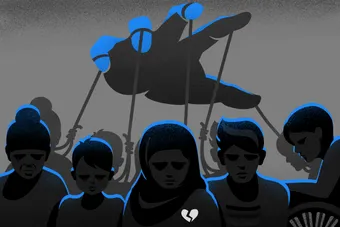Oct 25 2022
Kyrgyzstan, Bishkek city
DiscriminationNonphysical incidents

Identity disclosure, blackmailing, persecutions, violation of privacy right, and forced emigration accompany the actions of activists, who are in the high risk area due to their human rights activities.
An LGBTQ+ activist (no name is given for security reasons) working in an NGO as a foreign specialist was blackmailed in Bishkek by people who identified themselves as police officers.
They showed him a screenshot of a private video, where he was captured with another man.
‘Police officers’ demanded that the activist should cooperate with them and deliver information on his colleagues upon their request. In case of denial, he was threatened with spreading this video among his acquaintances, relatives and across the country.
In fear of persecutions, the victim of blackmail left Kyrgyzstan. But when some months later he tried to get back, he failed. He was shown a document confirming he was denied entry at the border point. The document was endorsed by GKNB (State Committee for National Security of the Kyrgyz Republic). The reason for denial was not specified.
In addition to blackmail and pressure, the victim was restricted in his freedom of movement.
Despite the fact that article 29 of the Constitution of the Kyrgyz Republic ensures everyone “right to privacy”, this right of the activist was breached. Moreover, it was breached based on his sexual orientation, citizenship and human rights activity.
Another case of disclosure of SOGI (note: sexual orientation and gender identity) and private life details was published in a video about “KyrgyzIndigo”, an LGBT organisation of the Kyrgyz Republic.
The video contained information and personal data of employees, their addresses and photos.
“After this information was disclosed, some employees of the NGO were spied on by unknown persons,” wrote activists in their report “Violence and discrimination against LGBTQ+ people in the Kyrgyz Republic”[1].
Previously, Kyrgyzstan-based human rights activists had also reported cases when personal data were publicly disclosed and posed a risk for life.
Activists cite another case when during the 2020 parliamentary election in Kyrgyzstan an intimate video of two men filmed on a hidden camera was posted on the internet.
The video disclosed their names, sexual orientation, places of study and work. Victims of discrimination reported that the provocative video was published after they were blackmailed by people who identified themselves as “police officers.” According to the victims, they were demanded to disclose information about LGBTQ+ activists and human rights defenders.
“In recent years, there have been increasing incidents when LGBTQ+ activists are used for political purposes and their private life becomes public,” said Nadira Masyumova, representative of the Coalition for Equality of Kyrgyzstan. “But the state does not respond to these cases.” Analysing these cases, Masyumova emphasised that there “are serious concerns about complicity of public servants in such cases.”
Another visible part of the LGBTQ+ community is trans* people who often become targets of media. A transgender is a man or woman, whose gender identity is different from the sex they were assigned at birth. For example, a person was assigned female at birth, and was brought up and educated as a female, but feels oneself as a male and wants to live and socialise as a male.
Several cases were documented when trans*people in bars, on the streets were filmed and their personal data were disclosed. And such cases were usually followed by physical assaults outdoors.
According to activists, only one case can be an inspiring example for LGBTQ+ people.
A trans*woman has managed to win the honour and dignity case in court against the media outlet that spread hate against her and revealed her personal information. The court awarded compensation to her in the amount of 10,000 Kyrgyz soms (115 USD dollars). However, she had to leave Kyrgyzstan for safety reasons.
This article was prepared under the project “Promoting media freedom and diversity through reporting on violation of rights and training of media workers in creating sensitive media reports on minority and marginalized groups” with the support of the Canada Fund for Local Initiative (CFLI).
Date of publication:
Oct 25 2022Incident type:
DiscriminationNonphysical incidentsIncident nature:
- stigma
- hate speech and public discrimination
- ban on entry or exit
- illegal wiretapping and surveillance
- Identity disclosure
- forced emigration
Incident date:
Mar 15 2022Number of victims:
5This website was created and maintained with the financial support of the European Union. Its contents are the sole responsibility of the School of Peacemaking and Media Technology in Central Asia and Coalition for Equality do not necessarily reflect the views of the European Union.
COVID 19 and discrimination
All materials published on this website are copyrighted. Republication is possible only with reference to the source and a link to mapincidents.kg